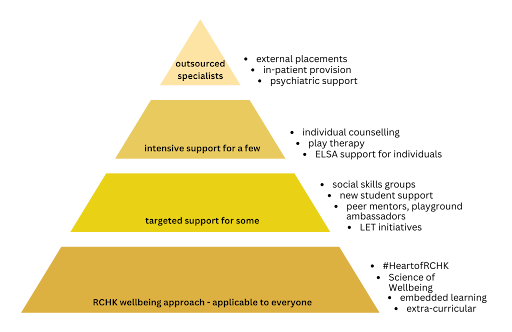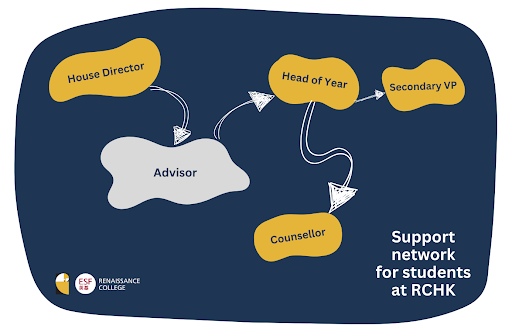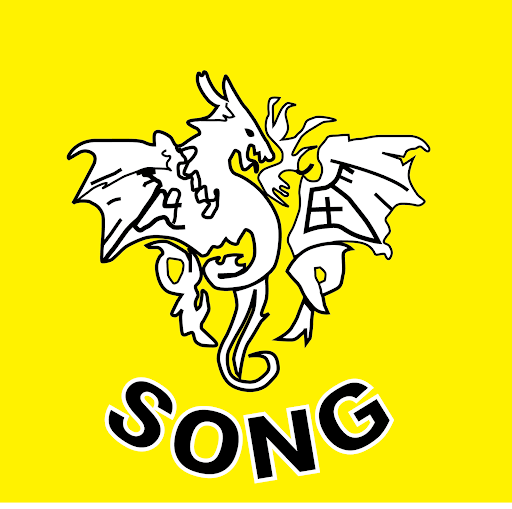|
If in need of emotional support or counselling during summer break, here are some resources compiled by RCHK Counselling team.
Help and Support available in Hong Kong
|
Tiered Approach
While we focus on wellbeing in all areas of learning and teaching, therefore taking a whole school approach, we also recognise that there are times when particular individuals require support with mental ill health. We take a tiered approach to the wellbeing support that is provided in school, as shown in this diagram.

Support System
We are a large all-through school on one campus. It is important that all of our students know their rights and responsibilities, make friends, feel safe and know who to go to for help. The student support system at Renaissance College provides a support network for students and helps promote a sense of community.

1 | Counselling Team
Our Counselling Team supports the RCHK community in moving toward greater wellbeing through a variety of counselling practices and specialist expertise. They liaise with wellbeing and pastoral staff in providing emotional support for our students and the wider RCHK community, including parents and school staff.
Why provide Counselling support at school?
Schools play a vital role in developing the emotional wellbeing and resilience of children and young people. By providing a supportive and caring environment, we enable our students to develop a sense of safety and belonging. This helps protect them from thoughts and feelings that can negatively impact many aspects of their lives, including achievement, motivation, relationships, and self-esteem. No matter who we are, everyone experiences challenges at some time or other that affect emotional wellbeing and happiness. Seeking counselling can be very helpful, offering support at challenging times. Here are some of the ways counselling can help:
|
Working with a member of the Counselling Team can lead to positive change. Enabling the development of new ways of coping and greater resilience can have a positive influence on managing future challenges.
Our Service
Our team of counselling and social work professionals provide support primarily to students but also to the wider Renaissance College community. This includes offering parenting or family support. All members of our team are highly experienced and knowledgeable practitioners. We are registered to practise and belong to professional associations in Hong Kong, Australia, the United Kingdom and the United States of America. All of our team adhere to a code of ethics and receive regular supervision. Our service is open to all members of the school community, it is confidential and can be offered in English, Cantonese or Mandarin. For further information or to get in touch with our team, please contact Acting Head of Counselling, Nia Cooper.
2 | Emotional Literacy Support Assistants (ELSAs)
Counselling is only one of the types of support provided within school. Some students' needs are best supported by short term, targeted interventions which can be provided by someone other than a counsellor. Some students benefit from working with an ELSA (Emotional Literacy Support Assistant).
Some students continue from ELSA support to counselling, while others need no further significant support at the end of their time working with an ELSA. The counselling support team liaises closely with the ELSA team when more support is required following a period of intervention with an ELSA.
Who is ELSA?
ELSAs (Emotional Literacy Support Assistants) are education assistants who have had special training from educational psychologists to support the emotional development of children and young people in school. ELSAs have regular professional supervision from educational psychologists to help them in their work.
How do ELSAs work?
ELSAs are pro-active, not reactive, in supporting students who have some social or emotional needs. ELSA support is not the same as counselling.
ELSAs help children and young people learn to understand their emotions and respect the feelings of those around them. They provide the time and space for pupils to think about their personal circumstances and how they manage them.
How long is an ELSA programme?
Most ELSA programmes will last for 6 to 12 weeks, helping the pupil to learn some specific new skills or coping strategies. Clear programme aims (SMART targets) are set early on and each session has an objective – something the ELSA wants to help the pupil understand or achieve. ELSA support is tailored to the needs of the child. Sometimes this might take place in a group, sometimes on a one-to-one basis.
Where and when does ELSA support take place?
At RCHK, there is a special ELSA room, which is quiet and peaceful. It is full of the resources that might be needed during ELSA sessions, and new resources are being added all the time. Usually, children enjoy going to the ELSA room for their sessions. If a child wants to use a different space, however, the ELSA will talk with the student to find out where would be a better space for them.
Your child will go with the ELSA at a time agreed with the classroom teacher. Because it is a type of learning, ELSA sessions do not take place during snack or lunchtime.
How will I know if my child is receiving ELSA support?
First of all, your child’s class teacher will contact you to let you know that your child will be receiving a programme of support from the ELSA. Then, once an ELSA has been assigned, the ELSA will be in touch with you. Sometimes they will ask you to complete a form for additional information. Working closely with home is the most effective way of supporting children as they learn new emotional and social skills. If you would like further information, the classroom teacher or the VP for Wellbeing will be happy to chat with you about the support your child is receiving.
What sort of thing will my child do when they are working with an ELSA?
That will depend a lot on the age of your child and what they are receiving support for! The ELSAs use books, games, video clips and crafts to work with students. Over time, they have built up a lot of resources and ideas, and they are advised by the LET team or the school counsellor if they need more suggestions.
Some of the activities that the students might undertake are:
|
3 | Year Level Coordinators and Heads of Year
| Year-level Coordinator in Primary |
Year 1 |
Ms. Sharon Matthews |
|
Year 2 |
Mr. Ward Cameron |
|
|
Year 3 |
Ms. Lucy Jack |
|
|
Year 4 |
Dr. Tracy Nelson |
|
|
Year 5 |
Mr. Jeff Reynolds |
|
|
Year 6 |
Ms. Katie Stears |
|
| Head of Year in Secondary |
Year 7 |
Mr. Nicholas Georgiou |
|
Year 8 |
Ms. Molly Austin |
|
|
Year 9 |
Ms. Stacey Leung |
|
|
Year 10 |
Ms. Sandra Gordon |
|
|
Year 11 |
Ms. Jen Dentry |
|
|
Year 12 |
Ms. Rebecca Thompson |
|
|
Year 13 |
Ms. Birdie Lodders |
We have appointed Heads of Year (HOYs) in the Secondary School to support our students’ academic and pastoral care needs. Our HOYs monitor students' academic performance, emotional and social welfare and behaviour management.
4 | Advisory (Secondary)
Our daily advisory classes are split into Year level. They provide a channel of communication for parents and teachers, and advisors are able to monitor students on a daily basis.
| Tang House Director | Song House Director | Ming House Director | Qing House Director |
| 14 Advisors | 14 Advisors | 14 Advisors | 14 Advisors |
 |
 |
 |
 |

